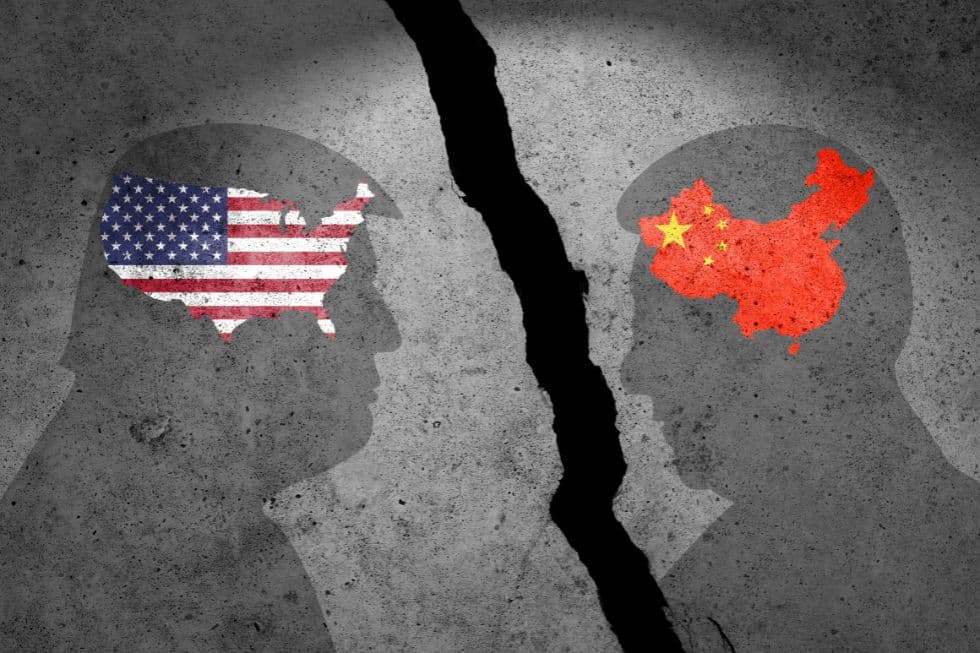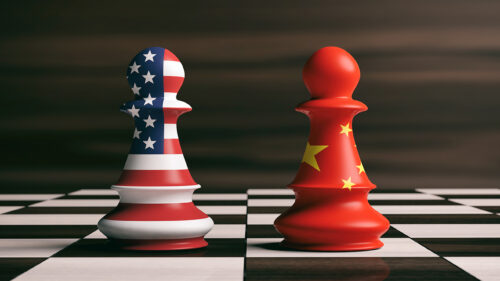As a Chinese economist, I generally do not comment on other countries’ internal affairs, especially political ones. However, from an economic perspective, the tariff war initiated by US President Donald Trump is truly unbelievable. Although China and the US reached a preliminary agreement and reduced tariffs during negotiations in Switzerland in May, it is unrealistic to think that the tariff war will cease. The two sides have reduced tariffs on the surface, but the strategic goals of both remain unmet, especially for the US. In the medium to long term, disputes and conflicts in trade are likely to continue until the US midterm elections next year. Therefore, we must examine the logic of the tariff war and its impact on both countries.
One of the most ridiculous measures came from White House trade adviser Peter Navarro, who proposed taking the US trade deficit as the numerator, dividing it by the total bilateral trade volume, and using the result as the tariff rate. This calculation ignores basic economic principles and appears in no reputable economics textbook.
China holds the bargaining chips
Objectively, Trump’s shocking tariff rates made it rational and correct for Chinese President Xi Jinping not to call him. Xi knew exactly what such a call would produce.
First, China currently holds a little less than $800 billion in US Treasury bonds. Trump could demand that China convert these into 100-year, interest-free bonds. He might also demand a sharp devaluation of the renminbi and ask China to adopt policies supporting the dollar’s global dominance.
Both of these demands are unacceptable. In response, China began strategic preparations to counter the US tariff policy. For example, China cut oil imports from the US and turned to Canada. It began importing beef from Brazil, soybeans from Argentina and pork from Spain. In other words, it replaced US goods with those from other countries.
China’s most powerful strategic tool may be its rare earth export controls. The global supply tension in rare earths arises not from scarcity but from refining technology. China possesses the most advanced rare earth refining technology and holds at least 90% of global patents. Other countries cannot build a complete rare earth supply chain quickly. It would take at least ten years and hundreds of billions of dollars to develop. Therefore, China’s restrictions could inflict severe losses on major American industries. For example, each F-35 fighter jet requires at least 920 pounds of rare earths.
Columbia University economics professor Jeffrey Sachs argues that, as a real estate developer, Trump lacks an understanding of trade. After he announced the tariff war, global stock markets lost $10 trillion in value in just two days. If tariffs really benefited the US as Trump claimed, the stock market should have surged. Instead, in April, following the announcement, stock markets around the world fell sharply.
Trump fails to understand that trade must benefit both sides. His policy splits the world into two camps: the US and everyone else. His tariff policy puts the US at odds with the global economy.
Another negative result appeared in late April. Investors sold approximately $200 billion in US Treasury bonds globally. Japan led with $30 billion, followed by the UK with $18 billion. Other countries accounted for the remainder. China likely sold bonds too, although it did not release data. If this trend continues, US asset prices will fall, and the US economy may slow significantly.
The largest holders of US Treasury bonds are not foreign governments but US financial institutions like securities firms, mutual funds and commercial banks. If their asset values collapse, US stock markets will fall further. This pressure led Trump to suspend new reciprocal tariffs for 90 days in late April. On May 25, he extended tariff negotiations with the EU until July 9, signaling a more passive stance.
Totalitarian systems respond differently to crises
Trump’s tariff policy sparked protests across the US. Dozens of leading economists, including Nobel laureates, wrote to the government demanding an end to the policy. Some state governments, including California, sued the Trump administration. US Treasury Secretary Steve Mnuchin, adviser Elon Musk and many members of Congress criticized the tariffs. Trump faced growing internal and external pressure. If this continues, Republican losses in the midterm elections could be significant. Many party members hope the Supreme Court will declare the policy illegal.
Unlike the US, China is not bound by democratic constraints. Xi does not face elections. China can afford to wait, but Trump cannot.
Trump also made undiplomatic remarks, saying, “I am telling you, these countries are calling us up, kissing my ass.” This damaged the US’s global reputation and pushed other countries closer to China, which now appears as the defender of global trade norms.
A Chinese proverb says, “It is easy to go from frugality to luxury, but hard to go from luxury to frugality.” If bottled water rises from $1 to $2, Americans may protest. But if a Chinese worker’s income drops from $800 to $400 per month, they are more likely to support the government. Chinese people have endured hardship for 70 years and are used to it. Americans, by contrast, depend on cheap Chinese goods. Sudden price hikes from switching to European products may prove unacceptable. China’s political system can absorb more domestic hardship.
The tariff war benefits China in key ways
The US wants to decouple from China by rebuilding a global industrial system without it. China, which once occupied the low end of the global value chain, has moved up and challenged US dominance. Trump wants developing countries like Vietnam or India to replace China. Foreign companies such as Apple have begun moving production. But this process takes time.
Trump’s sweeping tariffs triggered rapid decoupling. Other countries still depend on China’s supply chain, so China gained leverage in negotiations. Meanwhile, the US risks hyperinflation as its supply chain suffers. Political pressure on the Trump administration rises as a result.
For years, China exported goods to the US in exchange for dollars. But it could not use those dollars to buy what it needed, such as high-tech products. Now, China pays for oil in renminbi and settles trade with Russia in local currency. Holding large amounts of dollars no longer benefits China. The US external debt has reached $36 trillion. Trump even proposed 100-year interest-free bonds. China no longer wants to buy US Treasury bonds.
Some argue that holding dollars allows China to trade globally. But China is internationalizing the renminbi through bilateral swap agreements. These often include fixed-value anchors like the price of oil. If a foreign currency depreciates, the agreement adjusts automatically to preserve purchasing power.
China also lends renminbi to other countries, especially in Africa, often in exchange for natural resource collateral. Those countries then use the renminbi to buy Chinese goods. For this system to work, the renminbi must remain stable. But China must not overexploit trading partners or provoke tariffs in return.
In this context, Trump’s tariffs have promoted Chinese trade with other countries. Anti-American sentiment around the world helps China attract foreign investment. China also lowers its own market access barriers. For example, the Spanish prime minister recently visited China and signed a large pork export deal. At the same time, Chinese battery giant Contemporary Amperex Technology Co. Limited (CATL) announced a major investment in a factory in Spain.
The tariff war also reduces China’s fear of US sanctions if it takes military action against Taiwan. If China chooses to decouple fully, it has less to lose from tariff penalties. From a geopolitical perspective, this gives Beijing more room to act.
The US has historically helped China’s ruling Communist Party during times of crisis. President Harry Truman sanctioned the Kuomintang and indirectly aided Mao Zedong. President Jimmy Carter broke relations with Taiwan and welcomed Deng Xiaoping. President Barack Obama sent Secretary of State Hillary Clinton to China in 2012, facilitating Xi’s rise.
Whether Trump, as a Republican, will once again help the Communist Party survive is worth watching.
The views expressed in this article are the author’s own and do not necessarily reflect Fair Observer’s editorial policy.
Support Fair Observer
We rely on your support for our independence, diversity and quality.
For more than 10 years, Fair Observer has been free, fair and independent. No billionaire owns us, no advertisers control us. We are a reader-supported nonprofit. Unlike many other publications, we keep our content free for readers regardless of where they live or whether they can afford to pay. We have no paywalls and no ads.
In the post-truth era of fake news, echo chambers and filter bubbles, we publish a plurality of perspectives from around the world. Anyone can publish with us, but everyone goes through a rigorous editorial process. So, you get fact-checked, well-reasoned content instead of noise.
We publish 3,000+ voices from 90+ countries. We also conduct education and training programs
on subjects ranging from digital media and journalism to writing and critical thinking. This
doesn’t come cheap. Servers, editors, trainers and web developers cost
money.
Please consider supporting us on a regular basis as a recurring donor or a
sustaining member.
Will you support FO’s journalism?
We rely on your support for our independence, diversity and quality.









Comment